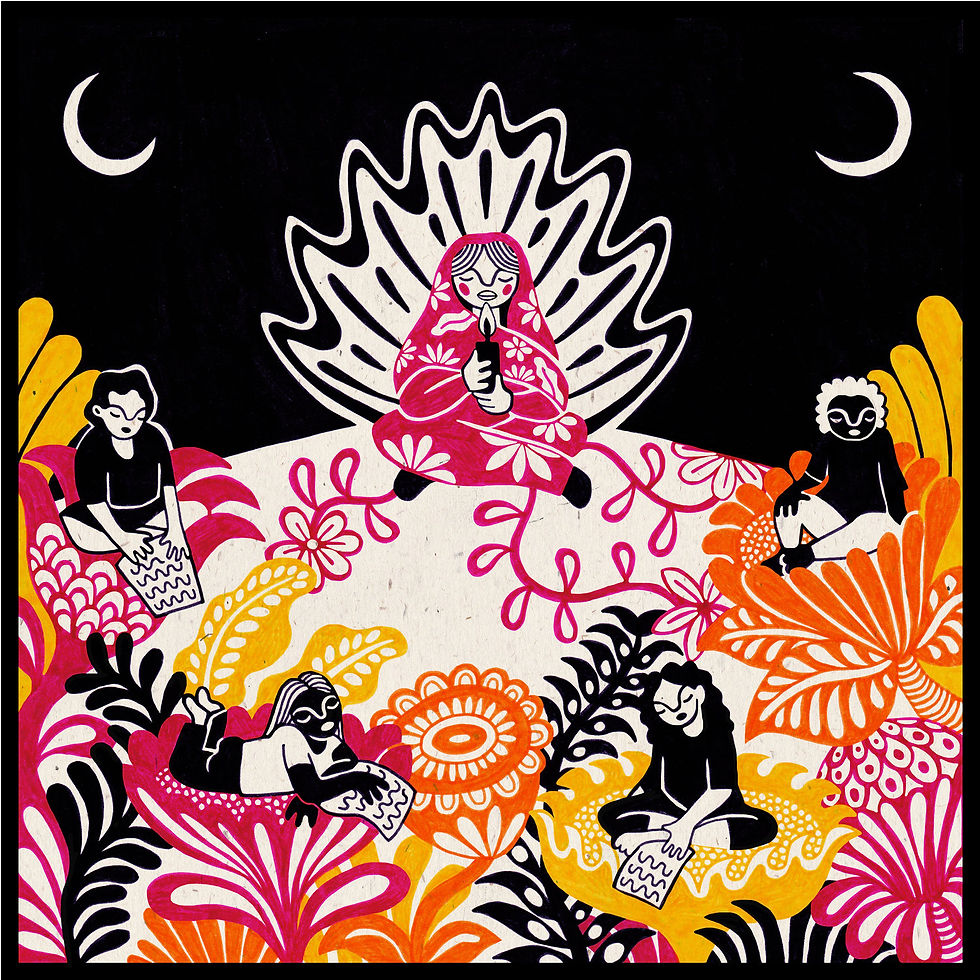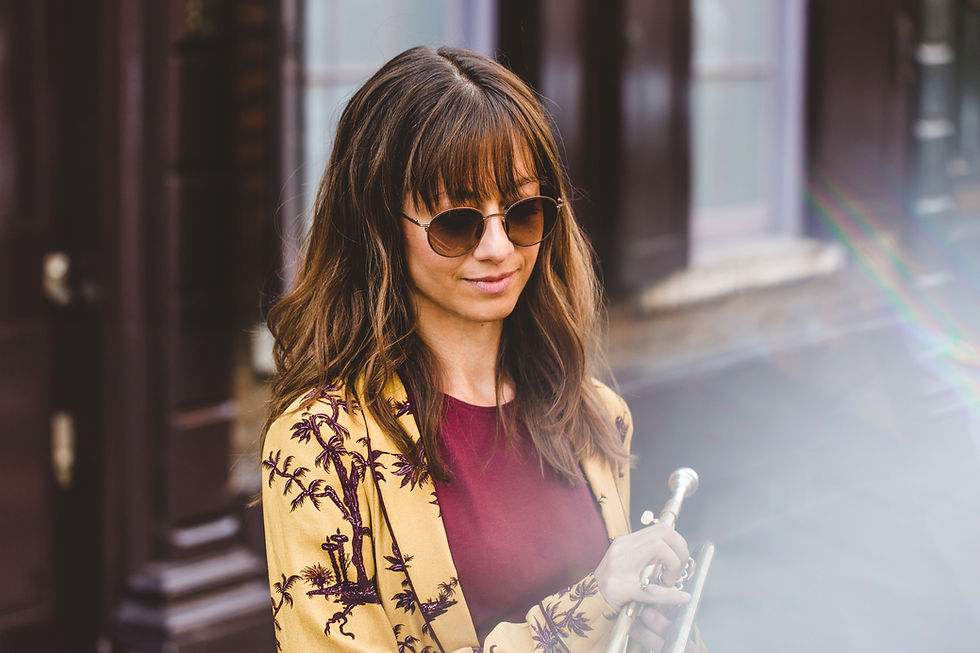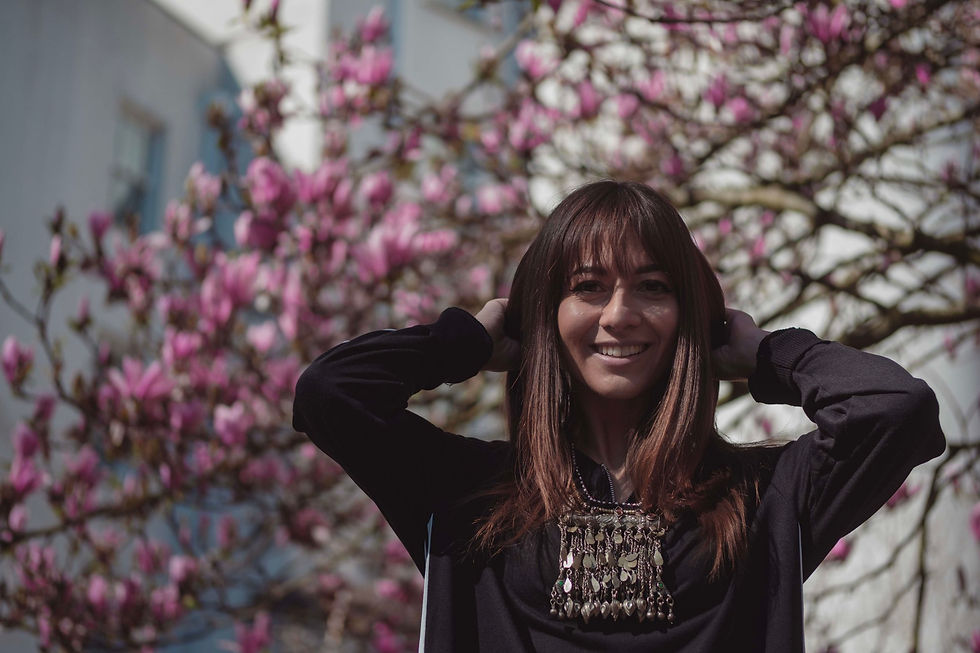Yazz Ahmed - POLYHYMNIA (Album Review & Interview)
- Hamish Irvine

- Oct 4, 2019
- 5 min read
Polyhymnia
Released: 11 October 2019
Album Rating: 4/5
Live Potential: 5/5
Favourite Tracks: Deeds Not Words (track 5) & Lahan Al Mansour (track 1)

That eastern, softened bold sound of the trumpet is unmistakable. Uniquely moving up and down Arabic scales, she paints a panorama of radiant sound. Yazz Ahmed returns with an innovative, wonderfully colourful conceptual album, Polyhymnia.
After the stellar success of La Saboteuse, Ahmed’s unique cosmic sound has been firmly stamped as a fiercely individual voice in the current jazz line up. This latest release, written in January 2015 over a single six-week period, is a record unlike her previous ones.
La Saboteuse is an inward-looking album, an expression of her creative struggles, but Polyhymnia is outward-looking. It’s a suite of six movements inspired by courageous women chosen by Ahmed. Ahmed’s chosen six are Haifaa Al Mansour, Saudi Arabia’s first female director; saxophonist, Barbara Thompson; The Suffragettes and three activists; Ruby Bridges, Rosa Parks and Malala Yousafzai. Polyhymnia is a Greek goddess of poetry, dance, arts and eloquence, and a fitting title for Ahmed’s third album.

Performed only once in its entirety since its premiere on International Women’s Day in 2015, Polyhymnia has been brought off the stage and into the studio, cementing these musical responses to these women in time.
“I tried to react to these women’s stories on an emotional level,” Ahmed told me. “Forgetting about myself, taking in their history, their beliefs and the music that surrounded them and their lives. That gave me a lot to think about. I want to write music that is reflective of my own personality as well as getting inspired, but also remembering to give my emotional take as well.”
As well as the women she champions, Ahmed champions her band; it is a diversified group of exceptional talent. The six women’s stories are carried so vividly in Ahmed’s compositions, then amplified and empowered by her guests.
Tori Freestone’s wild tenor saxophone cadenza on ‘2857’ (track 4) exemplifies the metaphorical depth of the album; regular collaborator Sophie Alloway drumming grounds Ahmed’s cosmic voice throughout; rising star Shirley Tetteh’s dreamy and golden soloing over Barbara is delightful; Camilla George, Nubya Garcia, Samuel Hällkvist and Sarah Tandy are another few of the twenty-five musicians who are amongst this great list.
“Adding these extra voices (since the original performance) inspired change and building extra layers and electronics. It’s really nice to hear the guests have their voices heard. It was really fun working with Shirley Tetteh and Samuel Hällkvist, they’re both wonderful guitarists who I have worked with a lot and they have very individual voices. In the studio, you can do lots of really fun things. You can chop it up, play in any way you like. That gave me the freedom to add extra layers, more textures, to give it a more fun experience for the listener. Something to get really deep into your soul.”

Powerful improvisation takes the compositions to the next level, one of the album’s standouts, ‘2857 is of no exception. Written for Rosa Parks, who in 1955 ignited a civil rights movement by refusing to give up her seat on a bus to a white man. Parks was consequently arrested, sparking revolutionary and historical change. Ahmed responded constructing her composition mathematically using the technique ‘tone row’. “It’s where you have a series of notes, and you make music out of that series in any order you choose. So, I chose random notes and used the 2857 number by starting on 1 note, then counted 1-2, then skipped 1. Then counted 8 more notes, and that would be the next note. So, the notes I chose became the melody. Then with the rhythms, I joined up the dots.”
It’s a mathematical foundation, but Ahmed responded emotionally in her voice. "I wanted the musicians in a collaborative improvisation to build up rage and express the evil of racism and frustration of how to fight for equality and everything being against you. There’s a tenor cadenza by Tori Freestone, which before that she’s playing something very calm which is supposed to be the voice of Rosa Parks and her very calm protest she made on that bus.”
‘One Girl Among Many’ (track 3) is another compositionally intriguing track, and probably the most forthright homage on the album, channelling Malala Yousafazi’s voice directly and musically. Ahmed explains, “I watched her UN speech on YouTube, and it brought me to tears. It wasn’t just the words that she recited, but the tone in her voice, it is very musical. And I thought ‘you’re going to make music from the quotes I find powerful’. So, I transcribed the words and then worked out what the notes were in her voice. Then I harmonised them and built melodies from them. I got everyone to chant which I hope feels mighty. It reflects when her voice rises and falls in pitch, and also in intensity. I wanted to bring that out musically.”
On ‘Deeds Not Words’ (track 5), Ahmed draws four instruments together, boldly harmonising, one by one, embodying the Suffragettes joining of voices as one. The layering of the instruments invokes an inspiring aura, as the whole album does in effect. “Using these electronics, especially the chaos pad, has become part of my voice. And I love using electronics because it just adds different colours to the natural sound of a trumpet or the flugelhorn. I like to live sample whilst I’m playing and mess around with it at the same time, so it’s kind of like a conversation. It’s fun, and you can be more inventive and create different worlds with these added effects.”

The album, at points, isn’t easy listening. A few of the stories translate unpredictably, and you can find yourself a bit lost in the direction the music is going. Track to track, there isn’t a natural flow to the album either, simply because each track is a standalone story. The album pullout is the reference the listener needs to experience this music. The women’s stories are briefly told featuring powerful quotes, alongside Ahmed commenting on her inspired compositional choices. It’s beautifully illustrated by Sophie Bass, who has designed Ahmed’s album artwork before. Experiencing this, alongside the music, is crucial to understanding and enjoying the music’s sound and concept.
Polyhymnia is packed with cascading electronic warping of trumpets, colourful eastern soundscapes, and strongly charged instrumentals that allow Ahmed to tell these women’s stories in her own language. It is an insight into Yazz Ahmed’s remarkable compositional ability, her inspirations, all attributed to these exceptional women.
This isn’t an album you’d regularly pull out for the joy of listening like perhaps you would with La Saboteuse. This is an extraordinary conceptual album, that exemplifies Yazz Ahmed’s passion for her music and the women who have inspired her. It is a wonderful addition to her recordings, and we can’t wait for her next personal instalment, and to hear Polyhymnia live in York next month.
Polyhymnia will be released via Ropeadope Records on the 11th of October 2019.
You can see Yazz Ahmed at the following dates:
4th October - Electric Dreams - Gosforth Civic Theatre, Newcastle
14th November - Yazz Ahmed Hafla Ensemble - Hull Jazz Festival, Hull
15th November - Yazz Ahmed Hafla Ensemble - The Crescent, York
16th November - Yazz Ahmed Quartet - The Good Shed, Stroud
You can keep up to date with Yazz Ahmed through her socials:







Comments